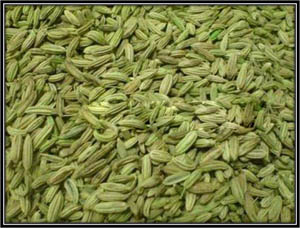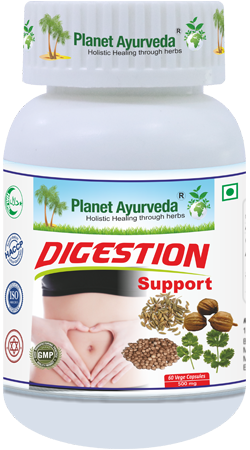ANISEED
 ‘Anise’ is a herb primarily used for culinary purposes. It belongs to the celery or ajwain family. The fruit borne by Anise is commonly known as ‘Aniseed’ or Hua-Hsain while its botanical name is ‘Pimpinella Anisum’. The Indian name for aniseed is ‘Velaiti saunf’.
‘Anise’ is a herb primarily used for culinary purposes. It belongs to the celery or ajwain family. The fruit borne by Anise is commonly known as ‘Aniseed’ or Hua-Hsain while its botanical name is ‘Pimpinella Anisum’. The Indian name for aniseed is ‘Velaiti saunf’.
CHARACTERISTICS OF ANISEED
Anise has feathery leaves and white and flat flower-heads. It grows up to 75 cms in height. Aniseed is grayish-brown to ground-grey oval-shape seed measuring 3.2 to 4.8 mm in length. It has an aromatic odor and a pleasant and distinctive liquorice taste.
Anise was originally grown in Middle East. It was also cultivated by early Romans and Greeks. It is now grown in other parts of the world including India, Europe, Mexico and Asia Minor. Ripe and dried fruits, and seeds of anise are widely used for preparing herbal supplements.
THERAPEUTIC POWERS OF ANISEED
Aniseeds have been used for years to flavor curries, cakes, sweets, biscuits and cookies while ancient Egyptians were the first to make good use of its medicinal properties.
Aniseeds are used in herbal medicines since they contain essential oils which have therapeutic properties like:
- Ability to relieve flatulence.
- Ability to remove catarrhal matter.
- Ability to remove phlegm from bronchial tubes.
- Ability to induce perspiration.
- Ability to increase discharge and volume of urine.
Aniseed extracts are used in various infusions and teas to relieve different ailments. An infusion prepared by boiling one teaspoon aniseeds in a cup of water, leaving it overnight, decanting the clear fluid and mixing with honey is administered to relieve indigestion especially when an individual experiences gurgling in the abdomen.
It also prevents fermentation and gas in the stomach and bowels. Be cautious not to over-boil aniseeds in water since it may lose its essential oils and digestive properties.
Anise-oil is a mild expectorant. It is used as an ingredient in many liqueurs and beverages. It is also used to flavor mouth-washes and other dental preparations.
NUTRIENT COMPOSITION
Anise is a warming, sweet and stimulating herb with expectorant and estrogenic effects. It also has aphrodisiac properties. Anise extract contains considerable amounts of protein, crude fibers, moisture, fatty acids and other useful ingredients like sugar, starch, essential oils ash and choline.
Anise-oil is a pale-yellow liquid with a distinct taste and odor of its fruit. It has replaced the use of anise fruits in various medicinal and flavoring preparations. The main constituent of anise- oil, ‘anethole’ gives it its unique flavor. It also contains chavicol, acetone, p-methoxyphenyl, methyl and traces of sulphur, and terpenes.
CARE FOR AILMENTS
As an ingredient of herbal products, aniseed relieves various internal and external ailments. It is also known for its aromatic relieving ability.
INTERNAL Uses:
- Digestive disorder: Aniseed expels wind from our stomach. It relieves colic and flatulence and promotes digestion. It is used in combination with other digestives like cumin, ginger, and pepper in various infusions. Aniseed extract is also an ingredient of ‘Gripe water’ used for infants.
- Cataract: Ingesting six grams of aniseeds everyday in the morning and evening relieves cataract. Alternately, one can consume twelve grams of a mixture prepared by mixing equal weights of powdered aniseed and coriander seeds with equal weight of unrefined sugar in the morning and evening.
- Asthma: Expectorant properties of aniseeds make it an ideal relieve for asthma. It also relieves cold, cough, bronchitis and sinusitis.
- Insomnia: Consuming warm tea prepared by boiling a teaspoon of aniseeds in 375 ml of water on simmer in a covered vessel for 15 minutes, straining the fluid and adding a dash of honey or hot milk after every meal or before bed-time relieves insomnia.
- Others: It relieves irritation and tension, brightens the eyes and restores mental equilibrium.
EXTERNAL Uses:
- Head-lice: It acts as an insecticide against mites, lice and vermin and demonstrates fungicidal properties.
- Chest-rub: It relieves bronchial and respiratory complications.
- Dentifrice: Fragrant antiseptic oil cleans teeth.
- Lightens complexion: tea brewed using aniseeds is cooled and applied on the face for lightening complexion.
AROMATIC AND ESSENTIAL OIL THERAPY:
Essential oils distilled from aniseeds are used to relieve:
- Flatulence.
- Anxiety.
- Menopause.
- Depression.
- Cough.
- Bronchitis.
SAFETY AND PRECAUTIONARY TIPS WHILE USING ANISEEDS
Herbal relieves can be co-administered with standard therapy after consulting a practitioner. Although aniseed is a safe herb, its trans-anethol estrogen-like property makes it unsafe for pregnant women and people suffering from estrogen dependent cancers or endometriosis.
PLANET AYURVEDA PRODUCTS THAT USE ANISEEDS
Currently there are no Planet Ayurveda Products that use Aniseeds as an ingredient in them; however the below mentioned Planet Ayurveda products have similar medicinal benefits as Aniseeds and can be used for ailments where aniseeds prove to be helpful:
Planet Ayurveda products are manufactured as per the traditional Ayurvedic science, using only pure and natural herbs; no chemicals or preservatives are used in any of our products. Our products are also never tested on animals and are made under the most stringent quality guidelines. So opt for Planet Ayurveda herbs and supplements for a healthier you.


